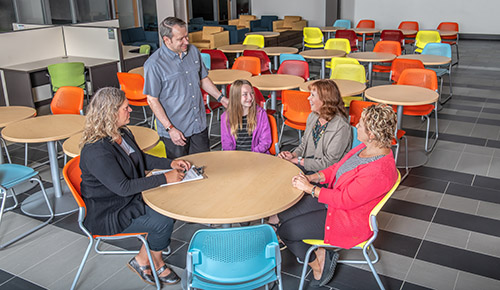
Pediatric infectious diseases specialist Wendy Vaudry (second from right) and nurses Barbara Neufeld (far left) and Christine Bon (far right), discuss research with participant Larissa Hamilton and her father Don. Larissa received early vaccination to study an immunization protocol for cancer survivors.
Larissa Hamilton was just nine years old when doctors diagnosed her with Acute Lymphoblastic Leukemia. For the next two years and three months, the little girl had round after round of oral, intravenous, and intrathecal chemotherapy to destroy the cancer cells.
The treatments left her with a weakened immune system and, because she couldn't have immunizations during treatment, her family worried she might fall dangerously ill if she encountered sick kids in the community. "It was extremely scary," says her mother, April. If that ever happened-if Larissa was exposed to a child with chickenpox at a birthday party, for instance-she'd have to be whisked away to hospital for immediate assessment.
After the treatments ended, the family cheered as Larissa's health-and her white blood cell counts-improved. "I was looking forward to getting her immunized again and caught up with her classmates so we didn't have to worry so much anymore," says April. But they were disappointed to learn that physicians typically waited a year after the end of treatment before vaccinating pediatric cancer survivors.
There are good reasons for this, says Wendy Vaudry, a professor and an infectious diseases specialist at the Stollery Children's Hospital. For one thing, physicians don't know how chemotherapy affects a patient's previous immunity to diseases they've already been vaccinated for. "Do we start all over again or pick up where we left off?" she says. It's also unclear how well a child will tolerate a vaccine shortly after cancer treatment, so physicians worry about the risk of adverse effects (which can be anything from a rash or fever to anaphylaxis). To answer these questions, Vaudry is leading a clinical study supported by the Canadian Immunization Research Network (CIRN). Through the network, her research team recruited a number of child survivors of leukemia-including Larissa-willing to receive early vaccination and undergo blood tests to study the immune system impacts.
This study, which has yet to be published, is one of many vaccine-related research projects Vaudry is involved with. Much of her work is connected with the Immunization Monitoring Program Active (IMPACT)-a national surveillance initiative managed by the Canadian Paediatric Society and conducted by the IMPACT network of pediatric investigators on behalf of and funded by the Public Health Agency of Canada. Vaudry is one of two co-principal investigators leading national efforts to track adverse events following vaccinations and study their effectiveness in preventing disease.
IMPACT gathers its data from 12 children's hospitals across Canada (which constitute more than 90 per cent of the country's specialty pediatric beds), including the Stollery Children's Hospital. Much of the data on adverse events comes from the reports of physicians and nurses, but the IMPACT team also gathers the data actively. "We check every single admission to the hospital and screen it to find out if it could be related to immunization," explains Vaudry. Although very rare, adverse events can happen following vaccinations and the safety of vaccines should never be taken for granted, she argues. This is especially important when new versions of vaccines are released to the market to protect people from ever-changing diseases like influenza. IMPACT has been collecting this data for 27 years and it is used by other health researchers. But Vaudry points out that government also benefits in a big way. That's why she now serves as vice-chair of the National Advisory Committee on Immunization (NACI), helping to shape the federal government's policy decisions about vaccination.
"The exciting thing about immunization research is that it can affect the health of the entire Canadian population, not just individual children," she says. "It's nice to see it translated into policy before my very eyes and know that it will affect the health of thousands of children."